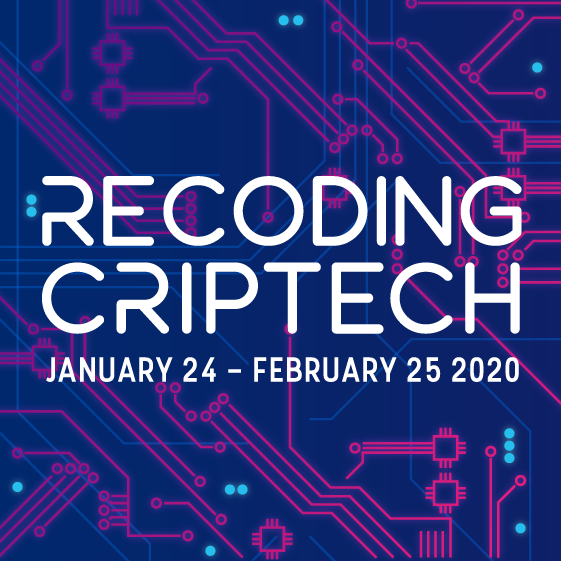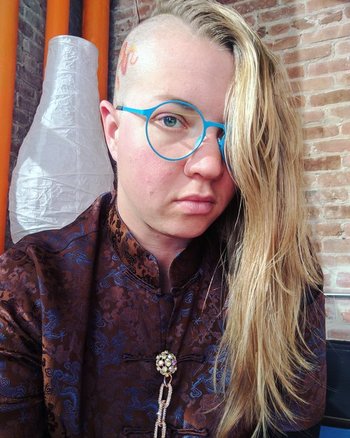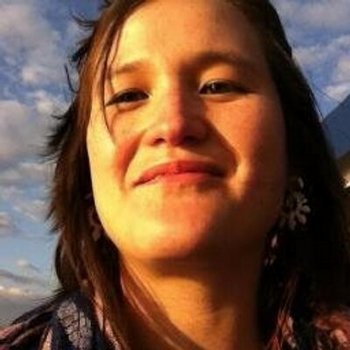Opening reception, Thursday, January 23, 2020, 6–9pm
Exhibition run, Friday January 24–Tuesday, February 25, 2020
Curated by Vanessa Chang and Lindsey D. Felt, Recoding CripTech reimagines enshrined notions of what a body can be or do through creative technologies, and how it can move, look, or communicate.
Working with a broad understanding of technology, from prosthetic tools to the built environment, this multidisciplinary community art exhibition explores how disability—and artists who identify as such—can redefine design, aesthetics, and the relationship between user and interface. Exhibiting artists engage with technology in manifold ways from conception to production and beyond. As the term “crip” reclaims the word for disability culture and recognizes disability as a cultural and political identity, so too do artists hack technologies to make them more accessible and inclusive.
“In academic circles and in the disability community, there is a recognition that people with disabilities have profoundly contributed to technological advancement, but we would like to nurture these conversations in public discourse and spaces,” say Chang and Felt. “Rather, technology is often held up as something of a cure for disability, instead of an ongoing dialogue between diverse bodies, abilities, and communities. While we’ve seen art and technology shows, and disability shows, we haven’t seen an exhibition that embodies the living interaction of these communities in the Bay Area.”
By cripping the camera’s gaze, Todd Herman asks us to reevaluate how we look at others. Spanning organic and virtual prostheses, M Eifler, Chun-shan (Sandie Yi), and Jillian Crochet make visible the private, and intimate lives of disability that intertwine care and memory. Jennifer Justice reveals built space as a technological incarnation of access and privilege, inviting us to reorient our relationship to these spaces. Sara Hendren, Alice Sheppard, and TEMPT ONE recreate urban spaces and movement through unexpected mediums. Darrin Martin and Allison Leigh Holt formulate a crip eco-consciousness that situates prosthetic technologies in natural environments and landscapes, and Sonia Soberats and Pete Eckert redefine the relationship of sight, touch, perception and the image.
Together, these artists inscribe new movements and navigations through private, public, virtual, and natural spaces and places.
“We’d like our audiences to reflect on and question for whom technologies and spaces are built, and to whom they deny access. By engaging a variety of senses in their interactions with museum spaces and artworks, we hope for them to understand how certain bodies have been privileged over others,” shares Chang and Felt.
Opening with a free, all ages reception on Thursday, January 23, 6–9pm, the evening program features an artist panel discussion and Q&A, led by disability scholar and UC Berkeley professor Karen Nakamura featuring disability activist and Disability Visibility host, Alice Wong.
Berkeley professor of English and disability studies scholar Georgina Kleege will guide participants throughout the exhibition with tactile and sensory aesthetic experiences with Tactile Explorations on Thursday, February 6, 6–9pm.
Recoding CripTech closes with Neurodivergent Media Workshop Thursday, February 20, 6–9pm facilitated by exhibiting artist and educator Allison Leigh Holt. Together, participants will develop scripts, learn storyboarding techniques, and stage scenes.
RECODING CRIPTECH
- Exhibiting Artists
- Jillian Crochet
- Pete Eckert
- M Eifler aka BlinkPopShift & Steve Sedlmayr
- Sara Hendren
- Todd Herman
- Allison Leigh Holt
- Jennifer Justice
- Darrin Martin
- TEMPT ONE
- Sonia Soberats
- Chun-shan (Sandie) Yi
- Alice Sheppard, in collaboration with Katherine Helen Fisher, Shimmy Boyle, Laurel Lawson, Lisa Niedermeyer, and Missy Mazzoli
- Yevgeniya Zastavker, and Katie Butler, Daniel Daugherty, Duncan Hall, Andrew Holmes, Erica Lee, Scott Mackinlay, Apurva Raman, March Saper, Alexander Scott, Kimberly Winter, Rachel Yang, Jingyi Xu, with support from Olin College.
Opening Reception Artist Panel & Discussion
Thursday, January 23, 6–9pm
Artist panel discussion and Q&A, led by disability scholar and UC Berkeley professor Karen Nakamura and featuring disability activist and Disability Visibility host, Alice Wong, performer and producer Claudia Alick, and exhibiting artists Darrin Martin and M Eifler aka BlinkPopShift. The panel will be recorded and uploaded to Wong’s podcast. To learn more visit somarts.org/events/recodingcriptechopening
Tactile Explorations
Thursday, February 6, 6–9pm
Led by disability studies scholar Georgina Kleege, participants will explore the exhibition through tactile and sensory aesthetic experiences. This program is limited to 12 participants, Eventbrite link and wait list to follow. To learn more visit somarts.org/events/tactileexplorations
Neurodivergent Media Workshop
Thursday, February 20, 6–9pm
Participants join exhibiting artist and educator Allison Leigh Holt to develop develop scripts, learn storyboarding techniques, and stage scenes. This workshop is limited to 10 participants, Eventbrite link to follow. To learn more visit somarts.org/events/neurodivergent



